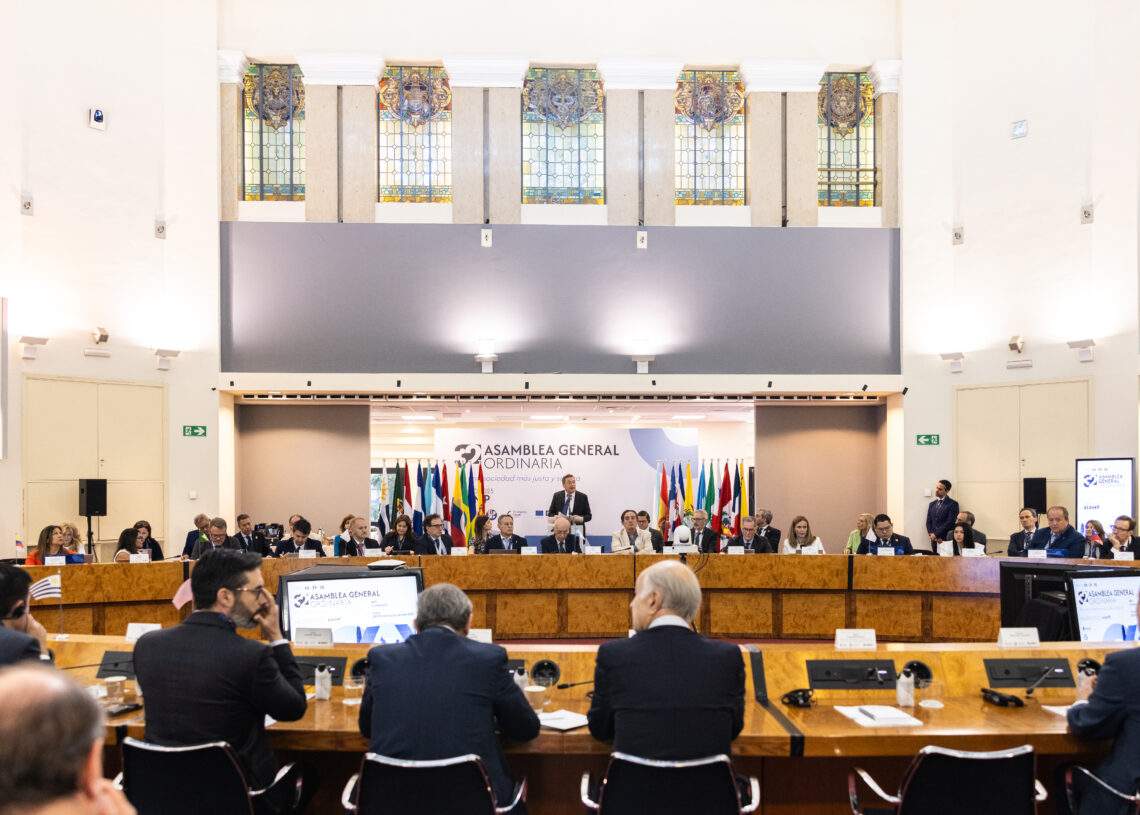The XXXII General Assembly of the Ibero-American Association of Public Prosecutors (AIAMP), held this week in Madrid, approved two technical documents developed in collaboration with the COPOLAD III Programme. These documents aim to strengthen the fight against drug trafficking through a comprehensive approach that respects human rights.
The approved documents are:
· The Undercover Agents Guide, designed to enhance drug trafficking investigations in line with international agreements and national legislation.
· The Guidelines for jointly addressing situations in which women and LGTBIQ+ victims of trafficking become involved in drug-related activities, proposing a gender-sensitive and victim-centred approach.
The Assembly brought together representatives from the Public Prosecutors’ Offices of the 22 AIAMP member countries, along with international cooperation bodies and programmes such as COPOLAD III. Attendees included Eduardo E. Casal, President of AIAMP and Attorney General of Argentina; Álvaro García Ortiz, Attorney General of Spain and Secretary General of AIAMP; Francisco Tierraseca, Director of the Foundation for the Internationalisation of Public Administration (FIAP), lead organisation of both EL PAcCTO and COPOLAD III; Borja Díaz Rivillas, Director of COPOLAD III; Javier Samper, Director of EL PAcCTO; Elena Martínez Rosso, representative of the Ibero-American Judicial Summit; Andrés Allamand, Secretary General of SEGIB; and Enrique Gil Botero, Secretary General of the Conference of Ministers of Justice of Ibero-American Countries (COMJIB).
Undercover operations with safeguards
The COPOLAD III Programme has worked jointly with the AIAMP’s Network of Drug Prosecutors (RFAI) to develop the Palermo Guide, a best-practice tool on the use of undercover operations in the fight against drug trafficking.
This guide provides concrete guidance for the use of undercover agents as an investigative tool, always in compliance with current legal frameworks and with full respect for fundamental rights, such as privacy, intimacy, and the inviolability of communications.
Undercover operations allow public officials or appointed individuals to infiltrate criminal organisations in order to gather evidence and identify those responsible. Given their complexity and potential impact on human rights, such investigations must be governed by principles including legality, subsidiarity, proportionality, and specificity.
Drug trafficking, gender, and trafficking in persons: an intersectional approach
Many victims of human trafficking—especially women and LGTBIQ+ individuals—are exploited at different stages of drug trafficking, from cultivation to transport and sale of illicit substances. These situations often occur in highly vulnerable contexts: forced migration, poverty, ethnic minorities, or unprotected childhoods.
To address this issue, COPOLAD III launched the initiative “The gender dimension in the relationship between drug trafficking and human trafficking”, in collaboration with three of AIAMP’s specialised networks: REDTRAM (Trafficking in Persons and Migrant Smuggling), RFAI (Drug Prosecutors), and REG (Gender Network).
The coordinated efforts of these networks led to the development of a regional diagnosis that analyses scenarios where victimhood and criminal prosecution overlap, and proposes practical guidelines for interventions based on a rights-based, gender-sensitive, and intersectional approach. Work is currently under way with the Public Prosecutors’ Offices of Argentina, Brazil, and Paraguay to adapt the guidelines to each country’s national context.
Drug trafficking and the environment: a new line of action
As part of its cooperation with AIAMP, COPOLAD III has also promoted a new agreement to develop guidelines for criminal prosecution in relation to the environmental impact of drug trafficking. This new line of work aims to produce a regional diagnosis on how Public Prosecutors’ Offices currently address this issue, while also proposing directives to improve the investigation and prosecution of environmental crimes linked to drug trafficking.
The initiative builds on COPOLAD III’s 2024 study “The Silent Destruction: Environmental impacts of drug trafficking and State responses in Latin America and the Caribbean”, which provides a comprehensive analysis of the ecological harm caused by these activities across the region.






